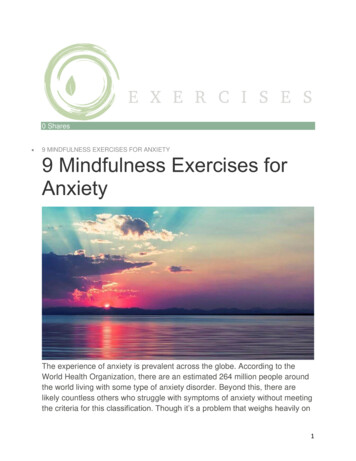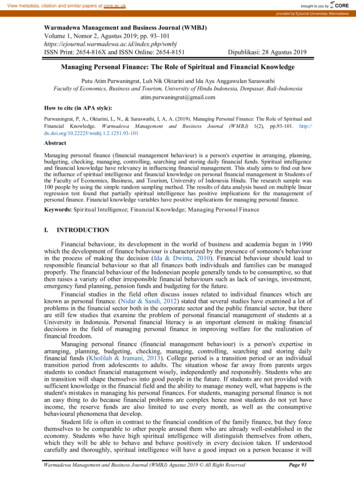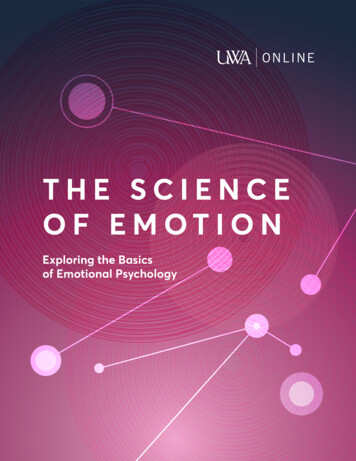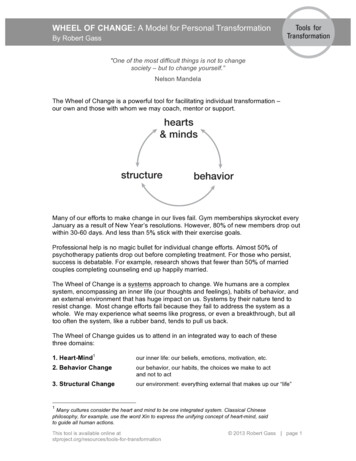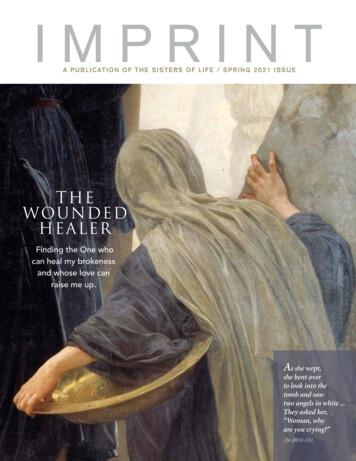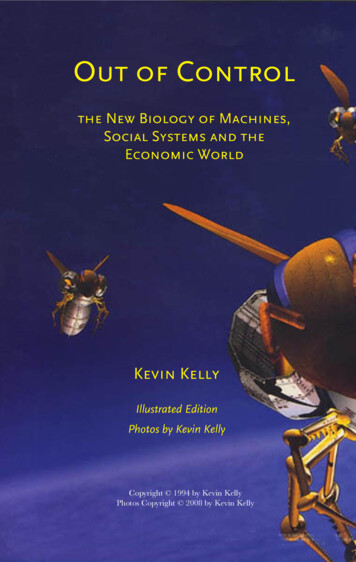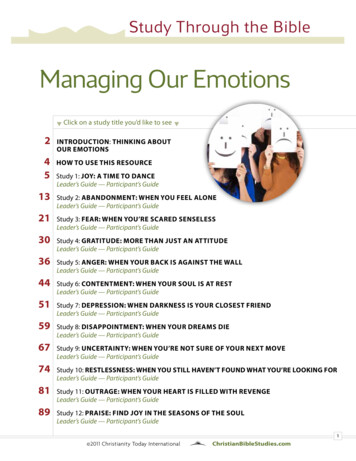
Transcription
Study Through the BibleManaging Our Emotionsq Click on a study title you’d like to see q2introduction: thinking aboutOUR emotions45how to use this resourceStudy 1: Joy: A time to danceLeader’s Guide — Participant’s Guide13Study 2: Abandonment: When you feel aloneLeader’s Guide — Participant’s Guide21Study 3: fear: when you’re scared senselessLeader’s Guide — Participant’s Guide30Study 4: gratitude: more than just an attitudeLeader’s Guide — Participant’s Guide36Study 5: anger: when your back is against the wallLeader’s Guide — Participant’s Guide44Study 6: contentment: when your soul is at restLeader’s Guide — Participant’s Guide51Study 7: depression: when darkness is your closest friendLeader’s Guide — Participant’s Guide59Study 8: disappointment: when your dreams dieLeader’s Guide — Participant’s Guide67Study 9: uncertainty: when you’re not sure of your next moveLeader’s Guide — Participant’s Guide74Study 10: restlessness: when you still haven’t found what you’re looking forLeader’s Guide — Participant’s Guide81Study 11: outrage: when your heart is filled with revengeLeader’s Guide — Participant’s Guide89Study 12: praise: find joy in the seasons of the soulLeader’s Guide — Participant’s Guide1 2011 Christianity Today InternationalChristianBibleStudies.com
M a n a g i n g O u r E m o t i o n s Thinking About Our EmotionsI n t ro d u c t i o nIntroduction:Thinking AboutOur EmotionsBy Timothy PeckAbout 18 years ago my wife and I went to a marriage counselor to deal with someproblems we were having in our marriage. It was nothing too serious, just some of thenormal struggles couples tend to have over the years. But I remember meeting withthe counselor one time in particular. She wanted me to talk about how aware I was ofmy emotions. I told her that I thought I was a pretty sensitive guy. So she asked me toname some of the emotions I’d experienced the previous week. I thought about it for aminute and really couldn’t think of anything. I said, “Well I can remember being hungrythe other day, and yesterday I was pretty tired.” The counselor told me that hunger andfatigue weren’t emotions. At that point I began to realize that, like a lot of men, I waspretty unaware of my emotions.Emotions are both complicated and complex, both mysterious and mystifying. Even theexperts are not sure exactly what causes us to experience emotions. Both social scienceand neurobiology have tried, to no avail, to explain the origin of emotions. And forChristians, emotions can be troubling, frustrating, and untrustworthy.Most Christian books about emotions emphasize that you can’t trust them. Maybe youhave seen a diagram of a train, with “facts” in front, then “faith,” followed by “feelings”represented by the train’s caboose. The idea is that you let facts lead, followed by faith,and eventually your feelings will tag along. Nobody wants their life to be like a train ledby its caboose, to let their emotions drive their lives. Yet emotions play an importantand complex role in our lives; they are deeply entwined with what we believe to be factsand what we have faith in. So as much as that diagram helped me for a long time in myChristian life, managing our emotions is more complex than the diagram suggests.Some emotions seem deeply spiritual; other emotions seem downright sinful. God createdus to experience emotions, yet there are still godly and ungodly ways to manage them.We must start with a common definition of emotions. Part of our emotional lifeoriginates in our brain chemistry. Dylan Evans, a professor at the University of London,2 2011 Christianity Today InternationalChristianBibleStudies.com
M a n a g i n g O u r E m o t i o n s Thinking About Our EmotionsI n t ro d u c t i o nsays that emotions “are hardwired into the human brain.” The Bible teaches that humanbeings are both body and soul, so a biblical view of emotions sees them as interplay betweenbody and soul.Emotions are physical sensations combined with thoughts and beliefs about particularevents and people. The biological dimension of emotions includes the physical sensationsthat accompany them. But there’s more to our emotions than the physical sensations thatgo with them. For example, imagine a person whose stomach is unsettled—a sensationwe call butterflies in our stomach—who also has sweaty palms and a flushed face. Theseare all physical sensations caused by our nervous system. What emotion is that personexperiencing? Well, it could be fear—perhaps a person who’s just been called into the boss’soffice after an announcement that the company is laying off some employees. But it couldalso be guilt, perhaps someone who’s just lied to her husband about where she was last night.But it could also be love, perhaps a 20-year-old man about to propose to his girlfriend.Fear, guilt, and love all have similar physical sensations. So emotions are more than just thephysical sensations—they’re also beliefs and ideas. And unlike moods, emotions are focusedon a particular person or thing.The Psalms express emotions clearly. Psalms is the longest book of the Bible and it waswritten by various people. And while the rest of the Bible is directed to us, most of thePsalms are directed back to God, as his people use these inspired lyrics to express their heartsto God. John Calvin called Psalms “an anatomy of all parts of the soul.” I follow WalterBrueggeman’s example of dividing the Psalms into three categories: Psalms of orientation—the psalmist’s outlook is, “Life makes sense.” Psalms of disorientation—the psalmist’s outlook is, “Life doesn’t make any sense.” Psalms of reorientation—the psalmist’s outlook is, “Life is starting to make senseonce again.”In this series, we will be looking at all three of these kinds of psalms to learn how to manageour emotions.—Timothy Peck is Pastor of Teaching at Life Bible FellowshipChurch in Upland, California.3 2011 Christianity Today InternationalChristianBibleStudies.com
M a n a g i n g O u r E m o t i o n s How to use this resource for a group studyHow to use thisresource for agroup studyThis Bible study can be used for an individualor a group. If you intend to lead a group study,follow these simple suggestions.1Make enough copies of the Participant’s Guide foreveryone in the group. If you would like your group tohave more information, feel free to copy the Leader’s Guide forthem instead.2Don’t feel that you have to use all the material in the study. Almostall of our studies have more information than you can get throughin one session, so feel free to pick and choose the teaching informationand questions that will meet the needs of your group. Use the teachingcontent of the study in any of these ways: for your own background andinformation; to read aloud (or summarize) to the group; for the groupto read silently.34Make sure your group agrees to complete confidentiality. This isessential to getting people to open up.When working through the questions, be willing to make yourselfvulnerable. It’s important for your group to know that others sharetheir experiences. Make honesty and openness a priority in your group.5Begin and end the session in prayer.4 2011 Christianity Today InternationalChristianBibleStudies.com
M a n a g i n g O u r E m o t i o n s Joy: A Time to DanceLeader ’s GuideL e a d e r ’s G u i d eJoy: A Timeto DanceLearn to rejoice in the past, present,and future. We think joy is dependent upon our circumstances, but the Psalms help us realizethat we can find joy in every circumstance.This study looks at ways to find joy in every areaof life, because joy stems from the knowledge of God’s work in our past,his plan for our present, and his power over our future.S cr ip t ure: Psalm 33: 1– 22B ased On : Th e ser mo n s er ies “M anaging O u r E m o tio ns,” by Tim o thy Pe c k ,PreachingTo day.com5 2011 Christianity Today InternationalChristianBibleStudies.com
M a n a g i n g O u r E m o t i o n s Joy: A Time to DanceLeader ’s GuidePart 1Identify the IssueN o te to Lea der : Provi de ea ch p e r son w it h the Par t icipant ’s Guide, inclu d eda t t h e en d of th i s study.How do we express joy? Psalm 33 is a song of joy and a call to worship, to assemble incelebration.In the Hebrew, all pronouns in this psalm are plural, meaning that this joy is something thathappens with others. The assembly is encouraged to express their joy with various kinds ofinstruments. Any and every instrument can be an instrument of joy. God deserves the bestpraise we can offer.But how can we express joy if we don’t feel joyful? Our circumstances are always changing, sowe must find our joy in God.Read Psalm 33:1–3.Discussion Questions:[Q] How would you define joy?[Q] What makes you feel joyful at church? Why? How does joy happen with others in a way that it doesn’t happen when we’re byourselves?[Q] What does it mean to find our joy in God rather than in our circumstances?Part 2Discover the Eternal PrinciplesTeaching Point One: We find joy by remembering God’s voice from the past.Though we usually think of “the word of God” as being the Bible, this psalm is talking aboutGod’s voice in actions and events. Verses 6 and 7 describe the Creation account and God’sparting of the Red Sea—God’s voice caused both miracles to happen. This psalm encourages usto remember how God has spoken in the past, as that remembrance will evoke joy in our hearts.John 1:14 says that God’s word became flesh in Jesus Christ. Every Passover, the people of Israelexperienced joy as they remembered God’s voice from the past. Every Easter, we celebrate withjoy the remembrance of how, through God’s voice, Jesus rose from the grave.6 2011 Christianity Today InternationalChristianBibleStudies.com
M a n a g i n g O u r E m o t i o n s Joy: A Time to DanceLeader ’s GuideSo the secret of joy is to take our focus off of our circumstances and ourselves and to put itfirmly upon God and his goodness. When we look at what he has done in the past, we are betterable to trust him for the future, because we realize that he is faithful and good.Read Psalm 33:4–9.[Q] Name all the things that we can praise God for, according to verses 4–9. How can knowing those things about God bring you joy?[Q] If we know God is right, true, faithful, just, loving, and powerful, how does that helpus cope with difficult circumstances?[Q] Have you ever experienced joy in the midst of something that was hard? What allowedyou to be joyful in that situation?[Q] Name a time in your own past when God proved his faithfulness. How can that help you trust him with the difficulties you are facing now?Teaching Point Two: We find joy by looking for God’s plan in the present.The psalm shifts here from the past to the present. God foils the plans of superpower nations,yet his plans are immovable.The psalm encourages us to look for God’s plan in whatever circumstance we experience. Jesuswas able to endure the Cross because of the joy set before him (Heb. 12:2).Sometimes God’s plan seems hidden and unseen. This is the theme of the movie Signs, a filmabout a pastor named Graham Hess who loses his faith after his wife dies in an auto accident.Reverend Hess resigns from his church because he no longer believes in God. As the movieunfolds, complete with an alien invasion of Earth, Graham suddenly sees how things thatlooked like random accidents are part of a larger plan. He realizes that God does have a plan,and that the things he thought were cruel and random really have purpose and meaning.Through that he rediscovers his faith in God.God is able to weave all of our life circumstances together to create a wonderful tapestry thataccomplishes his purposes.Read Psalm 33:10–12.[Q] How does knowing that God can thwart nations encourage you in your difficultcircumstances?7 2011 Christianity Today InternationalChristianBibleStudies.com
M a n a g i n g O u r E m o t i o n s Joy: A Time to DanceLeader ’s Guide[Q] How can you find joy in knowing that God’s plans stand firm forever? (Keep in mindthat he is good; he never has evil plans.)[Q] What nation is referred to in verse 12?Le a der ’s N ote: Verse 12 is of te n misuse d by Chr ist ians; it fo cuse s so lelyo n th e n ati on of I srael ’s unique role in t he plans and pur p ose s of G o d. N oo t her n ati on h as h e c h ose n for his inhe r it anceTeaching Point Three: We find joy by acknowledging God’s watchfulnessin our lives.These verses continue in the present tense, but shift focus to the individual level. God has formedevery heart and can see inside each of us, and though this is a scary thought, it’s also comforting.God not only sees our hearts; he sees our actions. God is concerned with our concerns. Somepeople believe that God is too busy running the world to care about our little struggles. Thispsalm shows that is not true.Acknowledging God’s watchfulness over our lives brings us joy and helps us live for God.Read Psalm 33:13–15[Q] Which of the following best describes your attitude toward God’s watchfulness? It terrifies me because I’m afraid of his disapproval. It brings me joy because I know he is taking care of me. It terrifies me when I’m being disobedient to him, but comforts me when I’m walkingin his ways. It brings me joy even when I know he disapproves, because that shows he cares for me. Other.- What does your choice tell you about your view of God?- What does it tell you about your view of yourself?[Q] What misconceptions of God do you need to discard in order to experience joy in hiswatchfulness?8 2011 Christianity Today InternationalChristianBibleStudies.com
M a n a g i n g O u r E m o t i o n s Joy: A Time to DanceLeader ’s GuideOptional Activity:Purpose: To help us identify our misconceptions about God.Activity: Write down the first 10 things to enter your mind when you think about God.Now list all of God’s good qualities mentioned in Psalm 33. How does your list comparewith the list in Psalm 33? What does that tell you about your view of God? Is it accurate, ortainted by experiences with past authorities?Teaching Point Four: We find joy by anticipating God’s mighty power.These verses shift to the future tense. The usual things we place our hope in are unreliable.Even the things that people usually look to for security are an illusion.Verses 18 and 22 refer to God’s “unfailing love”—his hesed, his covenant love. Our hope forGod’s mighty power in our lives is linked to God’s covenant love. Christians have entered intoa covenant relationship with God. God will do everything he has promised to do in our lives,and he has the power to do it.Read Psalm 33:16–22.[Q] In what ways do you hope in God’s unfailing love?[Q] Does your heart rejoice in God? Why or why not?[Q] hat does God’s power mean to your personal life? What does it mean for your future?Part 3Apply Your FindingsPsalm 33 encourages us to find joy in our relationship with God. Unlike joy that is based oncircumstances, joy found in God lasts forever. By remembering God’s voice from the past,looking for his plan and watchfulness in the present, and anticipating his power in the future,lasting joy can be found. The Bible promises we can find joy in any circumstance. ReadPhilippians 4:4 and James 1:2–3.In every situation, we can be assured that God is good and working on our behalf.[Q] What is the connection between praise to God and joy?9 2011 Christianity Today InternationalChristianBibleStudies.com
M a n a g i n g O u r E m o t i o n s Joy: A Time to DanceLeader ’s Guide Why are they so intricately linked? Why does joy elude us when we focus on ourselves rather than God?Action Point: Mention to the group one thing you are struggling with. It maybe a circumstance, a bad habit, or a relationship. Ask the group how theythink you can find joy in the midst of that difficult situation. End by praisingGod for his victory in this area and finding his joy.—Study by Timothy Peck, with JoHannah Reardon10 2011 Christianity Today InternationalChristianBibleStudies.com
M a n a g i n g O u r E m o t i o n s Joy: A Time to DancePa r t i c i p a n t ’s G u i d eP a r t i c i p a n t ’s G u i d eJoy: A Timeto DanceLearn to rejoice in the past, present,and future. We think joy is dependent upon our circumstances, but the Psalms help us realizethat we can find joy in every circumstance.This study looks at ways to find joy in every areaof life, because joy stems from the knowledge of God’s work in our past,his plan for our present, and his power over our future.S cr ip t ure: Psalm 33: 1– 22B ased On : Th e ser mo n s er ies “M anaging O u r E m o tio ns,” by Tim o thy Pe c k ,PreachingTo day.com11 2011 Christianity Today InternationalChristianBibleStudies.com
M a n a g i n g O u r E m o t i o n s Joy: A Time to DancePa r t i c i p a n t ’s G u i d ePart 1Identify the IssueHow can we express joy if we don’t feel joyful? Our circumstances are always changing, so wemust find our joy in God.Part 2Discover the Eternal PrinciplesTeaching Point One: We find joy by remembering God’s voice from the past.Teaching Point Two: We find joy by looking for God’s plan in the present.Teaching Point Three: We find joy by acknowledging God’s watchfulnessin our lives.Teaching Point Four: We find joy by anticipating God’s mighty power.Part 3Apply Your FindingsPsalm 33 encourages us to find joy in our relationship with God. Unlike joy that is based oncircumstances, joy found in God lasts forever. By remembering God’s voice from the past,looking for his plan and watchfulness in the present, and anticipating his power in the future,lasting joy can be found.—Study by Timothy Peck, with JoHannah Reardon12 2011 Christianity Today InternationalChristianBibleStudies.com
M a n a g i n g O u r E m o t i o n s Abandonment: When You Feel AloneLeader ’s GuideL e a d e r ’s G u i d eAbandonment:When YouFeel AloneFind strength when you feel forsaken. Many struggle with how to have faiththrough times of desolation. But theScriptures offer strength and hope to thosefeeling forsaken by God. When we feel abandoned, we should be honest about our pain, butwe should also look to community and to God to find strength. Psalm22 shows us how to do that.S cr ip t ure: Psalm 22: 1– 31B ased On : Th e ser mo n s er ies “M anaging O u r E m o tio ns,” by Tim o thy Pe c k ,PreachingTo day.com13 2011 Christianity Today InternationalChristianBibleStudies.com
M a n a g i n g O u r E m o t i o n s Abandonment: When You Feel AloneLeader ’s GuidePart 1Identify the IssueN o te to Lea der : Provi de ea ch p e r son w it h the Par t icipant ’s Guide, inclu d eda t t h e en d of th i s study.Sometimes we feel utterly alone, even when surrounded by other people. That feeling leadsto the thought that God and others have abandoned us. Psalm 22 expresses this feeling ofabandonment.Although this psalm was written sometime around 900 b.c., its correlation to Jesus ninecenturies later is amazing. (This is why the New Testament quotes or alludes to this psalm24 different times.) The first verse of the psalm has the words, “My God, my God, why haveyou forsaken me?” Jesus recited these words on the cross just before he died. The songwritercomplains that he’s scorned and despised by people, which is consistent with what happened toJesus 900 years later.Perhaps one of the most intriguing parallels is in verse 16, where the songwriter says thathis enemies have pierced his hands and feet. This sounds a lot like death by crucifixion. Butcrucifixion as a method of execution was unknown when this psalm was written. The Persianswould be the first to use crucifixion, though they wouldn’t start until a few hundred years later.Verse 16 seems to look forward to what Jesus would experience as his executioners pounded nailsinto his hands and feet.In verse 18, the psalmist describes his enemies as dividing his garments and casting lots for hisclothing. And that’s exactly what happened to Jesus as he was dying on the cross: Roman soldiersgambled for his clothing. So Psalm 22 is part prophecy, as it looks ahead to the suffering of Jesussome 900 years in the future. But it’s also a psalm of emotion that people have identified withthroughout the centuries.Discussion Questions:[Q] Have you ever felt abandoned by a person or by God? Explain.[Q] Did Jesus ever feel abandoned by God? If so, when and why?Le a der ’s N ote: He was abandone d by G o d on t he cross w he n he to o k o u rs in s up on h i msel f. Th i s is w hy he cr ie d out in agony in the fir st line o fPs al m 22.[Q] Since God abandoned Jesus, does that mean we might be abandoned, too?Le a der ’s N ote: J ust th e opp osite. B e cause J e sus to ok our sin ontoh i msel f, G o d n ever wi l l abandon us.14 2011 Christianity Today InternationalChristianBibleStudies.com
M a n a g i n g O u r E m o t i o n s Abandonment: When You Feel AloneLeader ’s GuidePart 2Discover the Eternal PrinciplesTeaching Point One: We all go through times when we feel abandoned.David, who wrote this psalm, felt tension between his experience and his theology. God not onlyseemed far away, he was also silent. David felt utterly forsaken, yet there is nothing in the psalm toindicate that God’s distance was due to David’s sin.David acknowledged his faith, yet he does not find the comfort his forefathers were given.Most people in the ancient world believed something called “the doctrine of divine retribution.”The essence of this doctrine was that if you were successful and wealthy, then God liked you. But ifyour life was painful and difficult, you had hidden sin, you were under God’s judgment. So wealthand happiness were viewed as infallible signs of God’s blessing, and sickness and trouble wereviewed as infallible signs of God’s judgment. The Book of Job was written, at least in part, to callthis idea into question, but it was widespread in the ancient world.Since David’s life was filled with difficulty, people assumed he was under God’s curse. Assumingthis idea of divine retribution, people would think, “He must have done something really awfulto deserve what he’s experiencing.” “He trusts in the LORD; let the LORD rescue him,” they saidwith sarcasm. Of course, people said the same thing to Jesus as he died on the cross. “If you are theking of the Jews,” they said, “save yourself ” (Luke 23:37). So while God seemed silent, the peoplewere speaking, and their words hurt. But David remembered how God cared for him in the past.It’s not unspiritual to feel godforsaken. Terry Anderson, a Christian journalist, was kidnapped byterrorists in 1985 and held hostage for six and half years. Jyodi, a teenaged girl in India, was trickedinto sex slavery where she contracted HIV and became pregnant. Mother Teresa felt abandoned byGod at times. Throughout her life she was plagued by feelings of forsakenness and aloneness, asreflected in her journal: “I am told God lives in me—and yet the reality of darkness and coldnessand emptiness is so great that nothing touches my soul.” Later she wrote, “I want God with all thepower of my soul—and yet between us there is a terrible separation Heaven from every side isclosed.”We all go through times of abandonment, and we shouldn’t try to hide it or pretend that we don’t.Read Psalm 22:1–21.[Q] Why do you think God sometimes seems silent? Why do you think he allows us to experience spiritually dry times as well as rich ones?[Q] What does David say in this psalm to attempt to gain perspective?15 2011 Christianity Today InternationalChristianBibleStudies.com
M a n a g i n g O u r E m o t i o n s Abandonment: When You Feel AloneLeader ’s GuideLe a der ’s N ote: He rem e mb e r s w hat G o d did for his ance stor s. He’s t r yingto rememb er th at G o d i s fait hful.[Q] Can we counteract feelings of abandonment the way David did?[Q] David pictured himself surrounded by wild animals, which were symbolic of hisenemies. Why is it often hard to trust others when we feel forsaken?[Q] What does this psalm teach us about being honest with God? How can God use our honesty?Le a der ’s N ote: W h en we are hone st ab out our fe e lings of de spair, G o dm e ets us wh ere we are and sustains us. I f we don’t admit it and tr y toto ugh i t out, we won’t se e our ne e d to le t him he lp us.Teaching Point Two: We can find strength by choosing to be incommunity.If we only had the first 21 verses of this psalm, we would feel despair. But something changesin verse 22. David’s situation has not changed; the only thing that has changed is that he is incommunity with God’s people.Despite our urge to isolate ourselves when we feel abandoned, choosing community will helpus find strength. We must choose to be with others because we know that strength comes fromrelationship. Choosing community means choosing to worship God with others as well asinvesting in their lives.Read Psalm 22:22–25.[Q] When you get discouraged, do you tend to withdraw or surround yourself with others? What kind of problems can withdrawing cause? What kind of community should we surround ourselves with when we arediscouraged?[Q] What is David saying to others in this psalm?Le a der ’s N ote: He i s pra ising G o d and e ncouraging othe r s to t r ust G o d.[Q] What does it do to your attitude to praise God to others? Give an example.16 2011 Christianity Today InternationalChristianBibleStudies.com
M a n a g i n g O u r E m o t i o n s Abandonment: When You Feel AloneLeader ’s GuideTeaching Point Three: We can find hope by looking to God’s futurekingdom.Being in community is not a cure-all for our feelings of abandonment. In addition to thestrength we gain from community, we also need hope.David’s situation hadn’t changed, but his outlook on life had. He pictured the futureconsummation of God’s kingdom, celebrated at a great banquet. He knew that both nations andfuture generations then would turn to God.Read Psalm 22:26–31.[Q] What kind of hope does God give us? Is it a wishful hope, such as “I hope God isfaithful”? Or is it a certain hope, such as, “My hope is in the fact that God is faithful”?Explain the difference.[Q] Which of the following brings you the most hope in God’s future kingdom? Singing God’s praises Reading God’s Word Seeing God’s hand in nature Remembering God’s goodness to you and others in the past Spending time with others who love God Reflecting on heaven Other- Explain your selection.Optional Activity:Purpose: To help us learn to bank on the certain hope of God’s goodness.Activity: Advise the following people as to how they can find hope in God: Jennifer, who is only 16, just lost her mother to cancer. Malcolm has lost contact with his only son, who ran away last year. Marian, who is a single mom, was just let go from her job. Karston was in a car accident that left him in a wheelchair.17 2011 Christianity Today InternationalChristianBibleStudies.com
M a n a g i n g O u r E m o t i o n s Abandonment: When You Feel AloneLeader ’s GuidePart 3Apply Your FindingsGod is not shocked when we feel forsaken by him. He became flesh in Jesus Christ to experienceabandonment on our behalf.But we can help each other through these times. Maybe you’ve heard the inspirational poemcalled “Footprints.” It’s about a person who looked back on their life and saw two sets offootprints in the sand, symbolizing Jesus walking with them through life. But during the reallytough times there was only one set of footprints, because during those times, God carried theperson.Many people have found hope and inspiration from that poem. But “Footprints” misses onecrucial dimension about life that this psalm emphasizes. In life, we were never meant to walkalone. If life is just me and God, two sets of footprints during the good times and one set duringthe tough times, then I may feel despair. Life is meant to be a whole bunch of footprints as wewalk together through this journey of life.A group of developmentally disabled people was competing in the Special Olympics. Duringthe 100-yard dash, the group of athletes all started running toward the finish line. But one ofthe runners tripped and fell down on the track. Then a strange thing happened—all the otherrunners stopped, turned back, and helped the fallen runner to her feet. Then, together, theyran toward the finish line. The runners chose finishing together instead of winning the raceindividually.[Q] If you are feeling despair, how can reaching out to others relieve your pain and restoreyour faith in God? What is the difference between that attitude and waiting for someone to come lift usup? Why does waiting for someone to help often fail to work?Action Point: If you are feeling abandoned or know someone else who feelsabandoned, the solution may be the same. Reach out to someone else and letGod use you to relieve another’s suffering. Tell your group about one personGod is prompting you to reach out to. Pray that each person in the groupwould have the courage to do so.—Study by Timothy Peck, with JoHannah Reardon18 2011 Christianity Today InternationalChristianBibleStudies.com
M a n a g i n g O u r E m o t i o n s Abandonment: When You Feel AlonePa r t i c i p a n t ’s G u i d eP a r t i c i p a n t ’s G u i d eAbandonment:When YouFeel AloneFind strength when you feel forsaken. Many struggle with how to have faiththrough times of desolation. But theScriptures offer strength and hope to thosefeeling forsaken by God. When we feel abandoned, we should be honest about our pain, butwe should also look to community and to God to find strength. Psalm22 shows us how to do that.S cr ip t ure: Psalm 22: 1– 31B ased On : Th e ser mo n s er ies “M anaging O u r E m o tio ns,” by Tim o thy Pe c k ,PreachingTo day.com19 2011 Christianity Today InternationalChristianBibleStudies.com
M a n a g i n g O u r E m o t i o n s Abandonment: When You Feel AlonePa r t i c i p a n t ’s G u i d ePart 1Identify the IssueSometimes we feel utterly alone, even when surrounded by other people. That feeling leadsto the tho
The Psalms express emotions clearly. Psalms is the longest book of the Bible and it was written by various people. And while the rest of the Bible is directed to us, most of the Psalms are directed back to God, as his people use these inspired lyrics to express their hearts to God. John Calvin called



